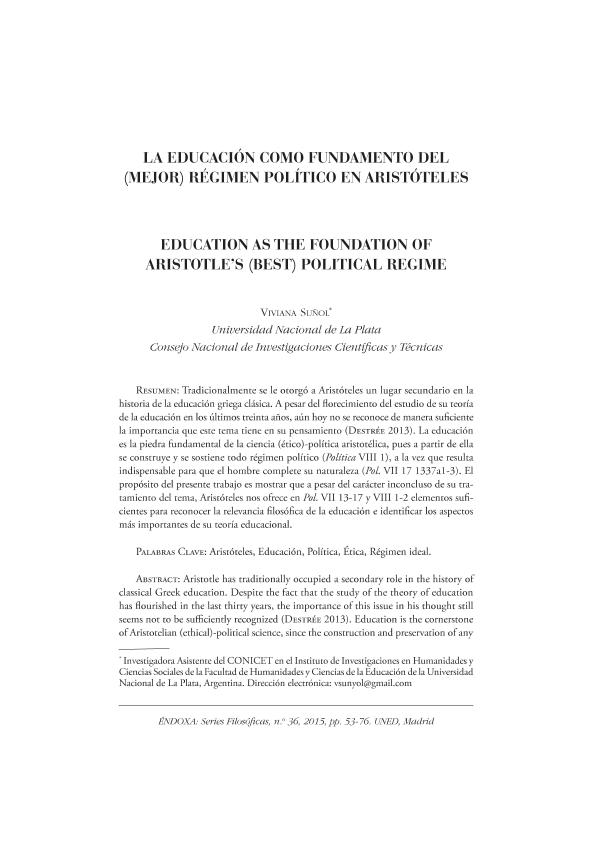Mostrar el registro sencillo del ítem
dc.contributor.author
Suñol, Viviana

dc.date.available
2016-12-01T19:47:54Z
dc.date.issued
2015-11
dc.identifier.citation
Suñol, Viviana; La educación como fundamento del (mejor) régimen político en Aristóteles; Universidad Nacional de Educación a Distancia. Facultad de Filosofía; Endoxa: Series Filosóficas; 36; 11-2015; 53-76
dc.identifier.issn
1133-5351
dc.identifier.uri
http://hdl.handle.net/11336/8617
dc.description.abstract
Tradicionalmente se le otorgó a Aristóteles un lugar secundario en la historia de la educación griega clásica. A pesar del florecimiento del estudio de su teoría de la educación en los últimos treinta años, aún hoy no se reconoce de manera suficiente la importancia que este tema tiene en su pensamiento (Destrée 2013). La educación es la piedra fundamental de la ciencia (ético)-política aristotélica, pues a partir de ella se construye y se sostiene todo régimen político (Política VIII 1), a la vez que resulta indispensable para que el hombre complete su naturaleza (Pol. VII 17 1337a1-3). El propósito del presente trabajo es mostrar que a pesar del carácter inconcluso de su tratamiento del tema, Aristóteles nos ofrece en Pol. VII 13-17 y VIII 1-2 elementos suficientes para reconocer la relevancia filosófica de la educación e identificar los aspectos más importantes de su teoría educacional.
dc.description.abstract
ristotle has traditionally occupied a secondary role in the history of classical Greek education. Despite the fact that the study of the theory of education has flourished in the last thirty years, the importance of this issue in his thought still seems not to be sufficiently recognized (Destrée 2013). Education is the cornerstone of Aristotelian (ethical)-political science, since the construction and preservation of any political regime and not only the ideal one, depends on it (Politics VIII 1), while it is essential for men to complete their nature (Politics VII 17 1337a1-3). The purpose of this paper is to show that, despite the apparently inconclusive nature of his treatment of the subject, in Politics VII 13-17 and VIII 1-2 Aristotle provides enough information to recognize the philosophical relevance of education and identify the most important aspects of his educational theory.
dc.format
application/pdf
dc.language.iso
spa
dc.publisher
Universidad Nacional de Educación a Distancia. Facultad de Filosofía
dc.rights
info:eu-repo/semantics/openAccess
dc.rights.uri
https://creativecommons.org/licenses/by-nc-nd/2.5/ar/
dc.subject
Aristóteles
dc.subject
Educación
dc.subject
Política
dc.subject
Ética
dc.subject
Régimen Ideal
dc.subject.classification
Ética

dc.subject.classification
Filosofía, Ética y Religión

dc.subject.classification
HUMANIDADES

dc.title
La educación como fundamento del (mejor) régimen político en Aristóteles
dc.title
Education as the foundation of Aristotle’s (best) political regime
dc.type
info:eu-repo/semantics/article
dc.type
info:ar-repo/semantics/artículo
dc.type
info:eu-repo/semantics/publishedVersion
dc.date.updated
2016-11-03T19:16:30Z
dc.journal.volume
36
dc.journal.pagination
53-76
dc.journal.pais
España

dc.journal.ciudad
Madrid
dc.description.fil
Fil: Suñol, Viviana. Consejo Nacional de Investigaciones Científicas y Técnicas. Centro Científico Tecnológico La Plata. Instituto de Investigaciones en Humanidades y Ciencias Sociales; Argentina
dc.journal.title
Endoxa: Series Filosóficas
dc.relation.alternativeid
info:eu-repo/semantics/altIdentifier/url/http://revistas.uned.es/index.php/endoxa/article/view/14836
Archivos asociados
